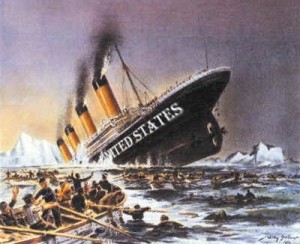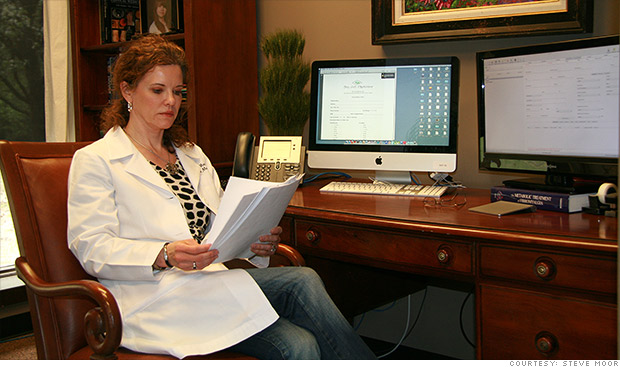 Economic Noise
Economic NoiseData are hard to deal with when your vision is on the wrong side of it. Those wanting to claim there is a recovery underway are having just this problem. These people either have no understanding of economics or they believe falsely that they can inflate “animal spirits” with their hyped reports and that will initiate a recovery.
There will not be an economic recovery given the economic policies of this country. A recovery is not unlikely, I would argue it is closer to impossible if not impossible. The reasons for this position are not complicated. In short, the nation has become an out-of-control welfare state that is rapidly destroying the incentives to work or create jobs. Government policies appear designed toward this end. One doesn’t need a high IQ or an advanced degree in economics to understand the problems.
There are innumerable factors responsible for the decline of the US. Only three important ones will convey why the economy is dying:
1. The rule of law and property rights are under attack.

What do you really own? The depositors in Cyprus believed they owned what was in their bank accounts. They found out otherwise. Bondholders of General Motors believed they were protected by bankruptcy laws when GM was bankrupted by the government. They found out otherwise. Do you own your pension plans and IRAs. Well you always believed you did except now there is talk about confiscating a portion or all of these funds.
How much of your income do you own? For those doing well, let’s say 60%. But that portion is under attack with the “need” for higher taxes and “fair share” gobbledegook. What about Social Security? Although the government sold it as a retirement policy and told you it is yours, the government says in fine print it is not. That is their excuse for not treating it as a liability on their balance sheet.
The fact is that the rules are being changed at will by the side who has lots of guns. The number of rules and laws that have been changed or ignored in the past several years makes one wonder what laws will remain. We are approaching the point where there are no rules which means there can be no society. Without cooperation, markets will cease to function efficiently or perhaps at all. Millions of people will starve to death under such conditions.
2. Obamacare has raised costs
The costs associated with Obamacare are still not known or calculable. The rules are still being written. Already there are thousands of pages. Even though we passed it as Speaker Pelosi suggested as a means to find out what was in it, we still don’t know as the rules are still being made up.
For sure the program is driving up the costs of medical care and driving down the quality. That is exactly the opposite of what was promised. Business firms face great uncertainty as to what this mandate will do to their costs and operating procedures. Obamacare is rising the cost of employees. When you penalize something, you get less of it. That is a prime reason why there is no employment recovery in this country.
Employers have frozen their hiring until clarity develops. The development of clarity is no assurance that they will change their behavior. If the costs are too high (and they appear to be for many smaller businesses who create the most jobs), then hiring will not return.
The effect on hiring is only one negative. Full-time workers are being made part-time in order that they be exempted from the Obamacare mandate. These steps are not something business wants to do, it is something they must do in order to survive.
3. Government policies have made the dole more lucrative than work
As we make it easier to get unemployment benefits for longer time periods, more people take advantage of the system. So too with food stamps and disability. All programs are at or near record levels in what is supposed to be four years into an economic recovery. For many, the benefits of becoming a government dependent exceed what they can earn. One study reported that a family of four, collecting all the benefits for which they were entitled, would have to earn $65,000 per annum to have the same after-tax purchasing power.
If you are a product of the government schools and are legal to work (i.e., have skills enough that you are affordable at the minimum wage or higher), at what point do you realize that there is no need to go through the hassle of actual work. You can live pretty well by staying home and taking advantage of the entitlements available to you. That is exactly what a larger and larger percentage of the population are realizing. In many cases, it is economically irrational to work.
This behavior creates a social pathology that only worsens over time. Kids learn from their parents that work is not necessary and the many ways to game the system. In this regard, look for this problem to become worse over time unless these programs are cut back.
There Can Be No Recovery
Despite all you hear coming from the government’s media megaphone, there is no economic recovery underway, nor can there be one. The policies in place ensure that one will not happen. Economics is not a top-down science as Keynesians and politicians want you to believe. You can throw as many Fed dollars into the system or devise innumerable government stimulus programs. These are all top-down. Economics is a bottom-up process that starts with individual decisions and behavior. Individuals respond to available choices and incentives. They act in their own self-interest not in the manner in which some government planner wants them to act. Top-down programs do not affect the incentives of the individual decision-makers.
We raise the costs on those who work (higher taxes) and the businessmen who provide the jobs. One of the basic laws of human nature is that when you penalize something or make it less pleasant, people will want less of it. It is not a mystery why business is not hiring and the number of workers is declining. The return to both is declining as a result of government policies.
We raise the rewards for not working. Another basic law of human behavior is that when you increase rewards for a particular kind of behavior, you will get more of it. It is not a mystery why more people are choosing the dole than ever before. Government has encouraged them to do by providing higher rewards.
Add in the regime uncertainty associated with unstable or unpredictable laws and regulations and you have the perfect storm. There is no incentive to hire. Business hunkers down not knowing what is coming their way next. They understand they are targets of this Administration. It is unlikely that there will be any improvement on this fron while Obama remains in office. This behavior has nothing to do with politics. Even businesses headed by Democrats are behaving in this fashion. It is self-interest as in the desire to survive that motivates this behavior.
Why The Economy is Dying
As government grows the private sector shrinks. As the private sector shrinks there are fewer goods and services produced (government produces no goods and few services). I believe it was Dick Armey who described this situation with the wagon analogy: there are more people riding in the wagon and fewer pulling the wagon. As the wagon becomes heavier, the remaining pullers must work harder to move it.
The pullers must support the riders. Government does not support the riders or anyone else for that matter. Whatever government has it has taken from the pullers. Whatever it doles out it must get from taxes, borrowing or printing new money. Regardless of which means it uses, it is all coming from the pullers. They pay the borrowing back. They have less as a result of higher taxes. They are made poorer by the rising prices from the printing of money.
As the burdens increase on the pullers and the benefits increase for the riders, more pullers decide to ride. The truly creative and talented can always make enough money to continue to work rather than ride. However, when their efforts can be expended in other countries that penalize them less, at some point they no longer pull the wagon. They leave the country to climes where they are treated better.
Each increase in government spending means requires more money from the private sector. That means greater distortions in the incentive-disincentive calculus that produces fewer people pulling the wagon. Now fewer people must support more non-producers. Every time someone gets in the wagon, the burden on the productive sector increases. More must be extracted from a smaller group to serve the increasing riders.
That is what is happening in this country. If it is not reversed, the economy will stagnate and eventually implode. This conclusion is dependent upon nothing more than simple arithmetic. How bad is the imbalance today? Tyler Durdenprovides some information (my emboldening in red added):
The punchline: 110 million privately employed workers; 88 million welfare recipients and government workers and rising rapidly.Mr. Durden’s article is worthwhile and informative. I encourage you to read it in its entirety, including the PDF attached.
And since nothing has changed in the past two years, and in fact the situation has gotten progressively (pardon the pun) worse, here is our conclusion on this topic from two years ago:
But for now, just stick head in sand, and pretend all is good. Self-deception is now the only thing left for the entire insolvent entitlement-addicted world.We have been writing for over a year, how the very top of America’s social order steals from the middle class each and every day. Now we finally know that the very bottom of the entitlement food chain also makes out like a bandit compared to that idiot American who actually works and pays their taxes. One can only also hope that in addition to seeing their disposable income be eaten away by a kleptocratic entitlement state, that the disappearing middle class is also selling off its weaponry. Because if it isn’t, and if it finally decides it has had enough, the outcome will not be surprising at all: it will be the same old that has occurred in virtually every revolution in the history of the world to date.

Is The Decline Inevitable?
Of course not. As Lawrence of Arabia stated: “Nothing is written.”
The Economic Solution
The solution to solving the problem is quite simple for an economist. Merely reverse the process. Make it attractive for people to jump out of the wagon and begin pulling. For businesses, make it attractive for them to hire. Make it unattractive to be on the dole. Reverse the growth of government and you increase the size of the private sector. More capital is made available for productive activities rather than being squandered by government. Talent stops leaving the country when they are treated more favorably here, whether this be via lower taxes or less onerous regulatory burdens. Then, get government out of the way and let markets solve the problem.
The Political Barrier
For the political class, the solution borders on the impossible. Politicians have bribed the citizenry with goodies for votes. They have sold the notion that government is responsible for all good things. The economic solution runs counter to everything that politicians have peddled. Further it reduces their power and ability to retain office, at least in a manner in which they are accustomed. It shrinks their perquisites. It shrinks their vote-buying ability. In short, it is virtually impossible for them to go along with such a solution.
What politicians thrive on is what created the current problems. Reversing this behavior is alien to them. They would not know how to behave under such conditions. Yet the economic solution is the only solution!
Do I expect politicians to change and save the country? No! Is it possible they could? Probably not, but “nothing is written.”
http://www.economicnoise.com/2013/04/05/the-country-is-over/

 RT News
RT News
 CNN – by Parija Kavilanz
CNN – by Parija Kavilanz


